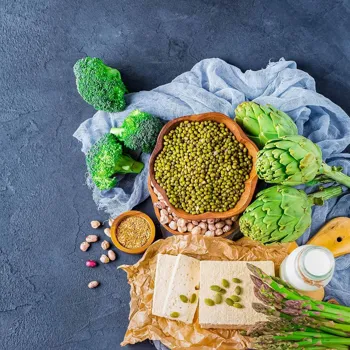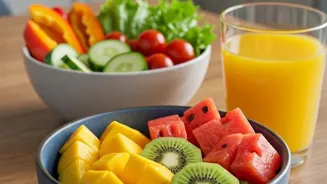Unlock the secrets of a balanced diet for a healthier you! Dive into 7 key components that transform your well-being
In the bustling landscape of India, where diverse culinary traditions thrive and modern
lifestyles often take precedence, maintaining a balanced diet is more important than ever.
A balanced diet isn't about restrictive eating or following fad diets; it's about fueling your body with the right nutrients in the right proportions to ensure optimal health and well-being. It's about making conscious food choices that support your energy levels, mood, and long-term health.
Embracing a balanced diet is an investment in yourself, a commitment to feeling your best every day.
A balanced diet is key for maintaining good health. It helps in weight management, boosting immunity, and preventing chronic diseases.
It provides the essential nutrients our bodies need to function properly. When we eat a variety of foods from different food groups, we ensure that we are getting the vitamins, minerals, and other nutrients necessary for our overall well-being.
Good nutrition from a balanced diet is not only important for preventing illness, but it is crucial for maintaining a healthy weight, preventing conditions like diabetes and heart disease, and improving our physical and mental performance.
Let's explore the seven key components of a balanced diet that can empower you to make informed choices and embark on a journey towards a healthier and happier you:
Carbohydrates: The Body's Primary Energy Source
Carbohydrates are often misunderstood, but they are the body's main source of energy. They fuel our muscles, brain, and nervous system. The key is to choose complex carbohydrates over simple ones.
Opt for whole grains like brown rice, wheat roti, oats, and millets such as ragi and jowar instead of refined grains like white bread or processed breakfast cereals. These whole grains are rich in fiber, which aids digestion, helps regulate blood sugar levels, and keeps you feeling full for longer.
In addition to whole grains, include legumes like lentils (dal) and beans, and starchy vegetables like potatoes and sweet potatoes in your diet. These provide a sustained release of energy and are packed with essential nutrients. Remember that moderation is key.
The amount of carbohydrates you need will vary depending on your activity level and individual needs. Consult a doctor or nutritionist to understand your body requirements.
Proteins: The Building Blocks of Life
Proteins are essential for building and repairing tissues, supporting muscle growth, and producing enzymes and hormones. They are the building blocks of our bodies and play a crucial role in almost every bodily function.

Good vegetarian sources of protein include lentils, pulses, chickpeas, kidney beans, soy products like tofu and soybean, and nuts and seeds. Incorporate a variety of these protein sources into your daily meals to ensure you are getting all the essential amino acids your body needs.
You can enjoy a bowl of dal with roti, add chickpeas to your salad, snack on a handful of almonds, or make a tofu stir-fry. Don’t underestimate the power of dairy – paneer (cottage cheese) and yogurt offer complete proteins and are versatile ingredients that can be used in countless dishes.
Ensure you are getting sufficient protein with every meal like breakfast, lunch and dinner!
Fats: Essential for Hormone Production and Nutrient Absorption
Fats are often seen as the enemy, but healthy fats are crucial for hormone production, nutrient absorption, and brain function. The key is to choose unsaturated fats over saturated and trans fats.
Incorporate sources of healthy fats like avocados, nuts (almonds, walnuts, cashews), seeds (chia seeds, flax seeds, sunflower seeds), and vegetable oils (olive oil, sunflower oil) into your diet.
Avoid processed foods, fried foods, and excessive amounts of ghee, which are often high in unhealthy fats. Remember, fats are calorie-dense, so consume them in moderation.
Using a small amount of olive oil for cooking or adding a handful of nuts to your snack is a great way to include healthy fats in your diet. Eating right amount of fats is key for keeping hormones balanced.
Vitamins: Micronutrients for Optimal Functioning
Vitamins are essential micronutrients that play a vital role in various bodily functions. They support immune function, energy production, and cell growth. A balanced diet rich in fruits and vegetables is the best way to ensure you are getting all the vitamins you need.
Eat a colorful variety of fruits and vegetables every day. For example, citrus fruits like oranges and lemons are rich in vitamin C, while leafy green vegetables like spinach and kale are packed with vitamins A and K.
Carrots and sweet potatoes are excellent sources of beta-carotene, which the body converts to vitamin A. Try including at least three different colors of fruits and vegetables in each meal. This will provide a wide range of vitamins and antioxidants to support your overall health.
Minerals: Essential for Bone Health and More
Minerals are essential for building strong bones, regulating blood pressure, and supporting nerve function. They work in synergy with vitamins to keep your body functioning optimally.
Calcium is crucial for bone health, iron for carrying oxygen in the blood, and potassium for regulating blood pressure. Dairy products like yogurt and paneer are good sources of calcium. Leafy green vegetables, lentils, and fortified cereals are excellent sources of iron.
Bananas, sweet potatoes, and spinach are rich in potassium. Ensure you are including a variety of these mineral-rich foods in your diet to meet your daily requirements.
In some cases, supplementation may be necessary, but it's always best to consult with a doctor or registered dietitian before taking any supplements.
Fiber: For Digestion and Gut Health
Fiber is essential for digestive health, regulating blood sugar levels, and promoting a feeling of fullness. It aids in healthy bowel movements and helps prevent constipation. Good sources of fiber include whole grains, fruits, vegetables, lentils, and beans. Include fiber-rich foods in every meal.
Start your day with a bowl of oats or a whole-grain roti. Add lentils or beans to your lunch and dinner. Snack on fruits and vegetables throughout the day. Aim for at least 25-30 grams of fiber per day.
Fiber also plays a crucial role in supporting a healthy gut microbiome, which is essential for immunity and overall well-being. Don’t increase your fiber intake too quickly, as it can cause digestive discomfort. Gradually increase your intake and drink plenty of water to help your body adjust.
Water: The Elixir of Life
Water is essential for all bodily functions. It helps transport nutrients, regulate body temperature, and flush out toxins. Dehydration can lead to fatigue, headaches, and constipation. Aim to drink at least 8-10 glasses of water per day.

Carry a water bottle with you and sip on it throughout the day. You can also increase your water intake by consuming water-rich fruits and vegetables like watermelon, cucumber, and spinach. Be mindful of your hydration levels, especially in hot weather.
Water is not only essential for physical health but also plays a role in maintaining good mental health by helping to regulate mood and cognitive function. Consider flavoring your water with slices of lemon, cucumber, or mint to make it more appealing.
AI Generated Content. Glance/InMobi shall have no liability for the content














